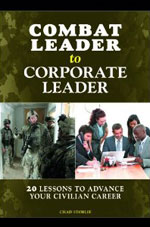
Leadership, Success, and Jobs, Jobs, Jobs!
by Chad Storlie, CombatToCorporate.com
1. Leverage Your Military Experience to Your Company and Job. Veterans need to translate their military skills to their businesses and organizations in a fashion that supports the culture and work practices of their company. The book, Combat Leader to Corporate Leader: 20 Lessons to Advance Your Civilian Career, gives veterans 20 ways to immediately leverage their military skills for an employer in a format that the employer needs.
2. Websites to Stay Up to Date – Quick and Easy on Business News. Just like reading the morning and evening intelligence reports, staying current on today’s important news is a must. Websites such as the New York Times, Business Week, Fortune, Washington Post, Google News Custom Alerts, SmartBrief, Harvard Business Review Blogs, and the Corporate Advisory Board all have daily e-mail’s that deliver the cutting edge business news to your e-mail for free. Scheduled e-mail news is the easiest and most efficient way to stay up to date.
3. Build a Network – Using Letters. Networking is clearly one of the best ways to get a job and advance your career. A military veteran should seek to contact other mid level leaders in an industry (industries) that they would like to work to learn more about the industry, what it takes to succeed, and to position them for advancement. When networking, letters are a wonderful resource to contact specific people in companies, because people receive very little “snail” mail anymore. Create your own personal direct mail campaign to build your network and learn how others succeeded in their career.
4. Teach A Class. Teaching in the military was something everyone did as a part of training no matter your service, rank, and specialty. Teaching is a great way to build confidence, position yourself as an expert, and improve your presentation skills. Volunteer with a charity, education, business, or government organization to teach a class or series of classes to show how military skill sets can be translated for business.
5. Further Your Education. Community colleges offer good overview business classes to improve your baseline knowledge of business in such vital areas as Accounting, Finance, Statistics, or Applied Mathematics. If possible, take them in person because fellow students, professors, and college staff are great resources for networking.
6. Mentor an Individual or Group. Mentoring or coaching is a fantastic skill to help build talent, commitment, and initiative in an organization. In the military, performance counseling sessions was a way to identify the standard of the organization, how a soldier performed to that standard, and what step (s) would be taken to improve the soldier’s performance. This mentoring is invaluable in organizations to help new employees or employees with high potential develop. Ken Hicks, an Army veteran and the CEO of Foot Locker, stated, “So I learned that you’re very dependent on your people to be their best. You train and develop and motivate them.”
 7. “A Desk Is A Dangerous Place From Which To View The World,” – John le Carre. In the military, inspections, field visits, and “walking the line” were an implicit responsibility for leaders at all levels. In business, conducting field visits with customers, manufacturing locations, and the like can make a huge difference in your career, allow you to understand the business, and establish a special relationship with your customers. If you do not know what to do, get out and look at the problem from your customer’s perspective.
7. “A Desk Is A Dangerous Place From Which To View The World,” – John le Carre. In the military, inspections, field visits, and “walking the line” were an implicit responsibility for leaders at all levels. In business, conducting field visits with customers, manufacturing locations, and the like can make a huge difference in your career, allow you to understand the business, and establish a special relationship with your customers. If you do not know what to do, get out and look at the problem from your customer’s perspective.
8. Start a Veteran’s Network in Your Organization. From small companies to large companies, military veteran employees are starting military veteran Employee Resource Groups (ERG’s) in their companies. Military Veteran ERG’s serve a variety of roles to help companies employ more veterans, keep veterans on as employees, serve as a resource base for deployed employees, and help veterans translate military skills into improving the company’s business. No matter your organization’s size, a military veteran ERG is a great idea.
9. Ensure a Professional Appearance. John Meyer, an Air Force Veteran and the CEO or Acxiom, stated in a Harvard Business Review Blog post, “I think professionalism and professional appearance is pretty important because it gives you the first impression, the benefit of the doubt. If you look the part, you get the opportunity to show whether you’re competent or not.” The new year is a great time to refresh your wardrobe and ensure you look the part. Remember, as a general rule, dress for the job you want, not the job you have.
10. Attend A Professional Convention, Speech By An Expert, Or Talk At A Local University. Staying abreast of the competition and cutting edge trends in your industry is vital. Ken Hicks, a US Army veteran and the CEO of Foot Locker, stated, “When I was in the Army I was in a cavalry regiment, and one of the cavalry’s jobs is to go out and scout. I send people out to our competitors’ stores all the time. We look at the competition, the press, any venue we can think of where we will see new ideas and new things.” Conventions are great ways to network, meet experts, see the competition, and understand how to succeed.
About the Author: CHAD STORLIE has had a distinguished career in both military and civilian service. Chad is a US Army Reserve Special Forces officer with 20 years of service in infantry, special forces, and joint headquarters units. He has served in Iraq, Bosnia, Korea, and throughout the United States. He has been awarded the Bronze Star, the Combat Infantryman’s Badge, the Meritorious Service Medal, the Special Forces Tab, and the Ranger Tab. Chad is a mid-level marketing executive and has worked in marketing and sales roles for various companies, including General Electric, Comcast, and Manugistics. In his spare time, Chad has taught marketing at Creighton University, developed Combat Analytics—a counterinsurgency assessment process—and written articles that have been published in several military journals. Chad holds a BA from Northwestern University and an MBA from Georgetown University.
Resources
- www.CombatToCorporate.com
- Order the book: “Combat Leader to Corporate Leader: 20 Lessons to Advance Your Civilian Career.”
Recent News Articles of Interest on Applying Military Skills to Second Careers:
- (1) Harvard Business Review – Frontline Leadership Blog: Military Skill Sets Lead to Organizational Success by Chad Storlie-
- (2) Harvard Business Review – Frontline Leadership Blog: Manage Uncertainty with Commander’s Intent by Chad Storlie –
- (3) Charlotte Examiner – Combat Leader to Corporate Leader –
- (4) Civilian Job News – Management Material: Marketing Your Skills to Civilian Employers –
- (5) Georgetown University Alumni Program Webinar – Video: Career Change Boot Camp for Veterans by Chad Storlie and Anne Jones.
ATTENTION READERS
We See The World From All Sides and Want YOU To Be Fully InformedIn fact, intentional disinformation is a disgraceful scourge in media today. So to assuage any possible errant incorrect information posted herein, we strongly encourage you to seek corroboration from other non-VT sources before forming an educated opinion.
About VT - Policies & Disclosures - Comment Policy



